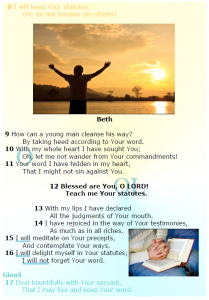 Though verses 9 and 11 are among the best-known verses of the psalm–and rightly so–it seems to me that verse 12 is the centerpiece of the Beth passage, distinguishing itself in a number of ways. It is distinctive first of all in its brevity; few verses of the psalm are marked by such simplicity of expression. It also is marked by its expression of appreciation for the person of God himself. Here and in the two preceding verses, the psalmist declares outright what he implies throughout the psalm: the object of his desires is not primarily God’s statutes, but God himself. (So the repetition of “heart” in those verses is especially apt.)
Though verses 9 and 11 are among the best-known verses of the psalm–and rightly so–it seems to me that verse 12 is the centerpiece of the Beth passage, distinguishing itself in a number of ways. It is distinctive first of all in its brevity; few verses of the psalm are marked by such simplicity of expression. It also is marked by its expression of appreciation for the person of God himself. Here and in the two preceding verses, the psalmist declares outright what he implies throughout the psalm: the object of his desires is not primarily God’s statutes, but God himself. (So the repetition of “heart” in those verses is especially apt.)
The word “blessed” occurs in the psalm only in verses 1, 2, and 12. The first two refer to those who follow God’s ways, and the last refers to God; the blessedness we attain by walking God’s paths is a reflection of his blessedness.
The phrase “Teach me your statutes” appears seven times in the psalm, always in the second half of the verse. In the first six instances, the verb is in the imperative tense. The last time, in verse 171, the psalmist declares “My lips shall utter praise, for you teach me your statutes”–an indication that his oft-repeated request has been granted.
Material riches are mentioned only four times in the psalm (verses 14, 72, 127, and 162), and never in a negative way. The psalmist has nothing bad to say about money (though the “covetousness” and “worthless things” of verses 37 and 38 could be applied to an inappropriate attitude toward material blessings)–it’s just that its worth pales in comparison to that of God’s word.
The law of God as a source of joy is a theme that runs below the psalm like an underground river, frequently breaking through the surface like a refreshing spring (as in verses 14 and 16, with “rejoiced” and “delight”). I hope we can all come to share that delight in God’s word. Memorizing 176 verses–let alone trying to live by them–is a grim task if done only through a sense of duty. Accompanied by joy, though, the work of memory is light, like the seven years Jacob worked for Rachel that seemed to him as a day.
Notes on memorization, Ps. 119:9-16
I’ve marked again on the page layout for this section the occurrences of “Oh” and “O Lord,” because they’re so easy to forget. I have a hard time not marking a lot more things, but I don’t want to cause confusion, either. I’ll point out some things below and let you decide whether it would help you to make a note of them on your verse list. (Note that these observations are true for the NKJV, and may not be so for other translations.)
Verses 13 and 14 each use the word “all”–another word that’s easy to forget if you’re not careful.
There is a wonderful uniformity of verb tense in the Beth section:
10 I have sought you
11 I have hidden
13 I have declared
14 I have rejoiced
You’ll come to appreciate this consistency as you notice the lack of it in other places in the psalm. When you have fifty or sixty verses to review, you’ll find yourself occasionally wondering things like, “Was it ‘I kept’ in this verse, or ‘I have kept’?” (See versees 56 and 22.) Noting now that the simple past tense (“I sought” or “I declared”) does not occur in the Beth section should help you keep these verses straight.
Are you planning to memorize the numbers as well as the verses? If so, this would be a good time to start working on that. Have someone ask you to quote a specific verse and see how you do.
If you don’t care about the numbers, that’s okay! It’s possible to memorize and recite the psalm without the numbers, and we won’t think any less of you. The psalm existed many centuries before it was numbered, so obviously you don’t have to memorize the numbers in order to appreciate the psalm. (The numbering of Bible verses is a relatively recent development, dating back only to the middle of the 16th Century.) On the other hand, the psalm was written originally as an acrostic, so the first word of each verse clearly identified its approximate location in the psalm. There are still advantages to knowing where to find each verse, so I would encourage you to give it a try.
